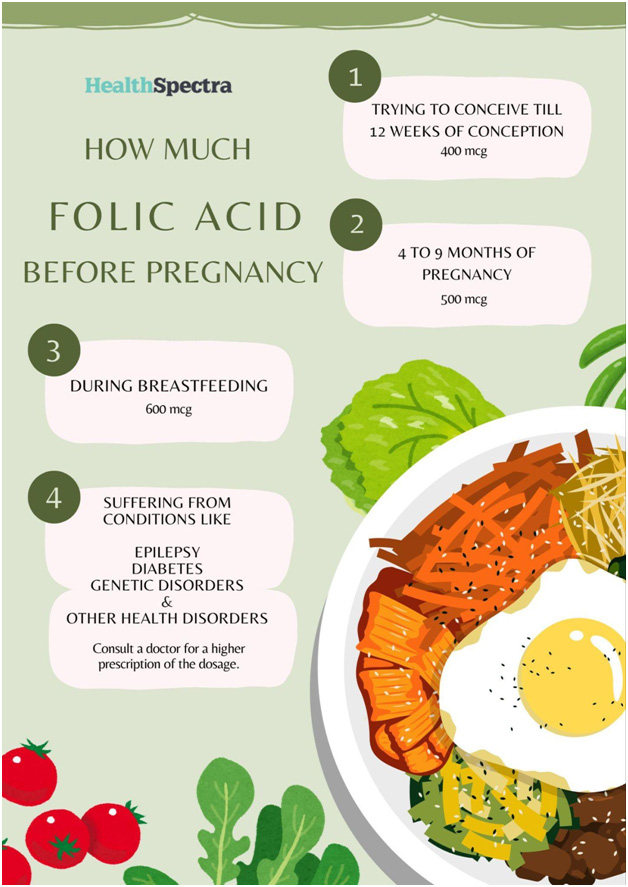Affiliate Disclaimer
Some links in this article are affiliate links. We may earn a small commission if you make a purchase through these links, at no extra cost to you. We only recommend products we find useful to our readersPregnancy and prenatal vitamins are like two peas in a pod. For every expectant mother, the safety and wellness of the baby are paramount, and taking folic acid before pregnancy is a critical step toward it.
Folic acid is known as the “superfood of pregnancy.” It plays a critical role in fetal development at an early stage of pregnancy.
This essential vitamin is widely prescribed by gynecologists to support healthy growth and prevent deformities or congenital issues in babies.
If you want to know the benefits of folic acid before pregnancy, this guide will walk you through it. So, what is folic acid, and why is it one of the most crucial prenatal vitamins besides other pregnant women’s essentials?
What is Folic Acid?

Folic acid is a synthetic form of folate, or Vitamin B9.
It is essential for the growth and maintenance of cells, DNA, and RNA. This vitamin is vital in preventing DNA damage and mutations, which can cause congenital health issues in newborns.
Importance of Folic Acid Before Pregnancy

Folic acid, a vital B-vitamin (Vitamin B9), plays a crucial role in cellular development and helps prevent neural tube defects in the developing baby. It’s essential to begin folic acid supplementation before pregnancy to ensure optimal health outcomes for both mother and child. This vitamin helps in DNA repair, reduces the risk of congenital abnormalities, and supports the healthy development of the fetal brain and spinal cord during the critical early stages of pregnancy.
While folic acid is naturally present in foods like leafy greens and whole grains, it is often difficult to obtain adequate amounts through diet alone. Most women are advised to take supplements, especially during the first trimester, when the fetus’s neural tube is forming.
Folic acid is also vital for overall health, as it supports the production of red blood cells, reducing the risk of anemia, fatigue, and other health issues. Deficiency in folic acid can cause serious complications, including spina bifida, anemia, and premature birth.
For women planning pregnancy, it is recommended to start folic acid supplements at least three months before conception and continue for the first three months of pregnancy. Even in unplanned pregnancies, once pregnancy is confirmed, folic acid supplementation should begin immediately.
Here are the seven benefits of Folic Acid for pregnant women or women looking to become pregnant:
1. Prevents Neural Tube Defects

One of the primary benefits of folic acid is its role in preventing neural tube defects (NTDs), such as spina bifida, anencephaly, and encephalocele. These birth defects can affect the brain, spine, or spinal cord and typically form in the first month of pregnancy, often before a woman realizes she’s pregnant.
- Spina Bifida: One of the most common forms of NTD, Spina Bifida, is caused when the vertebrae fail to close completely, leaving gaps that expose the spinal cord. This can result in the spinal cord protruding from the spine. Common complications include leg paralysis, involuntary urination or defecation. While some cases of Spina Bifida are treatable, many face lifelong challenges.
- Anencephaly: The neural tube facilitates the development of the brain in the fetus. When folic acid levels are insufficient, the upper part of the neural tube, responsible for brain formation, may fail to close completely. Infants born with Anencephaly usually lack a large portion of their brain and skull and thus have extremely low life expectancy.
- Encephalocele: Encephalocele affects nearly 375 babies in the United States each year. In this condition, a membrane sac containing the brain pushes out through an opening in the skull. Surgery is usually required after birth to relocate the brain into place and close the gap. However, the long-term prognosis is variable in relation to the level of the defect.
Adequate folic acid intake before and during early pregnancy significantly reduces the risk of these serious conditions.
2. Prevents Autism

Studies (R) show that pre-conception folic acid intake may be used to reduce the risk of autism spectrum disorders in babies. Another study (R) concluded that babies born to mothers who took folic acid before pregnancy had a lower incidence of autism symptoms compared to those whose mothers did not take the supplement.
However, it’s important to note that folic acid intake should be within the recommended levels. Excessive consumption can have adverse effects, so it’s essential to follow medical guidance to avoid potential risks.
3. Avoid Premature Birth

Prevention of preterm labor is one of the most significant benefits of folic acid taken before pregnancy. According to studies, sufficient intake of folic acid helps in ensuring full-term pregnancies since its deficiency may lead to early onset of labor and associated problems.
While unplanned pregnancies are common, unplanned folic acid deficiency should not be. As such, women of childbearing age who intend to have children someday should include adequate Vitamin B9 in their diets.
4. Fetal Growth and Development

Folic acid is important for both a pregnant mother and her fetus because it contributes to the rapid growth of the placenta and fetus. Folic acid helps produce DNA and enables necessary cell division, which are both important for the continued growth and development of the fetus.
A lack of folic acid before and during pregnancy can severely limit the development of the fetus, even resulting in complications. Sufficient intake of folic acid is required to assist in such critical processes, thus aiding in proper fetal development and helping prevent the occurrence of defects at birth and other issues.
5. Reduced Risk of Cleft Lip Palate

Other notable advantages of folic acid consumption prior to conception include its effectiveness in reducing cleft lip and palate in newborns. Studies indicate that a deficiency of folic acid may be a central causative factor for babies born with cleft lip and palate.
Studies (R) have confirmed that ensuring adequate folic acid levels before pregnancy can significantly reduce the risk of these congenital conditions, emphasizing the importance of this nutrient in prenatal health.
6. Lowered Risk of Miscarriage

The most common risk factor for miscarriage or spontaneous abortion is insufficient folic acid in the body. Elevated homocysteine in the blood is one of the causes associated with miscarriage.
Maintaining proper folic acid levels during pregnancy helps regulate homocysteine levels, reducing the risk of miscarriage and supporting a safer pregnancy. Ensuring adequate folic acid intake is crucial for both the mother’s health and the baby’s development, promoting a secure and healthy pregnancy.
7. Prevents Anemia

Fetal anemia is a significant consequence of folic acid deficiency during pregnancy. Folic acid is important in the production of red blood cells, which prevents anemia both in the mother and the developing fetus.
The proper intake of folic acid will ensure the healthy formation of red blood cells, thereby reducing the risk of anemia-related symptoms such as fatigue, weakness, and developmental complications in the fetus.
Folic Acid-Rich Foods to Consume Before Pregnancy

Although doctors usually prescribe prenatal vitamins after confirmation of pregnancy, pregnant women must have a diet rich in Vitamin B9, which is folic acid, even before getting pregnant.
Ensuring adequate folic acid before conception helps to provide the body with much-needed nutrients, thereby supporting early fetal development even before pregnancy is confirmed.
Some of the folic acid-rich foods are:
1. Vegetables

Let us begin with vegetables rich in folic acid, which one should have in his/her daily diet to gain from. Some of the folic acid-rich vegetables include:
- Peas
- Potato
- Asparagus
- Greens: Mustard Greens, Lettuce, Spinach, Fenugreek leaves
- Baby Carrot
- Cauliflower
- Lady Finger
- Green Pepper
- Radish
- Corn
2. Fruits
The following fruits are rich sources of folic acid:
- Oranges
- Kiwi
- Watermelon
- Banana
- Pineapple
- Berries: Raspberries, Strawberries, Blackberries
3. Nuts

If fruits and vegetables are not exactly your thing, try adding some of these nuts that are rich in folic acid too. Some of the high folic acid nuts are:
- Walnuts
- Hazelnuts
- Almonds
- Sunflower seeds
- Cashewa
- Peanuts
- Sesame seeds
4. Grains

Grains make up for the majority of your body’s folic acid needs even before conception. Some of the widely used grain forms that have a high amount of folic acid content include:
- Oats
- Cereals
- Brown rice
- Pasta
- Whole grain flour
These grains are not only beneficial for supporting the growth and development of the fetus but also provide sustained energy to the mother during pregnancy, which is an added bonus.
5. Legumes

Legumes are another excellent source of folic acid before pregnancy. Some legumes that provide a good amount of folic acid include:
- Lentils
- Chickpeas
- Kidney beans
- Wheat germ
- Soybeans
However, it’s worth mentioning that these folic acid-rich foods are not a supplement. They do provide a large amount of folic acid but may not be sufficient if you use them alone.
To get the maximum benefits in pregnancy, combine these foods with folic acid supplements.
How Much Folic Acid Do You Need Before Pregnancy?

The American Academy of Pediatrics recommends that all women of childbearing age regularly include folic acid in their diet. Folic acid is vital before and during pregnancy to support proper fetal development and contribute to an easy delivery.
We have compiled a table below with the dosage of folic acid suggested for pregnant women. This will enable you to know how much folic acid is required by your body, before and during pregnancy.
 Side Effects of Folic Acid Before Pregnancy
Side Effects of Folic Acid Before Pregnancy

Like many other vitamins or minerals, excessive absorption of folic acid can cause hidden side effects that many people are unaware of.
If you have been consuming folic acid before pregnancy, it is important to ensure that the levels are maintained within the recommended amounts and not exceeded.
Some of the common side effects of higher doses of folic acid are as follows:
- Abdominal cramps
- Diarrhea
- Rash
- Sleeping disorders
- Irritability
- Confusion
- Nausea
- Behavioral changes
- Seizures
- Gas
- Sour stomach
Conclusion
Folic acid before and during pregnancy ensures proper growth and development in the fetus. Consuming the right amount of folic acid prevents health risks due to excessive consumption.
Severe health conditions are caused by the lack of folic acid that can be avoided by adequate intake before pregnancy.
Folic acid supplements should be taken after consulting your healthcare provider to avoid serious problems such as birth defects and, particularly neural tube defects.
Always consult a doctor to ensure proper dosage and avoid excessive intake.
-
Aug 2018Written by Somapika D
-
Dec 2024Edited by Lakshmi Gayatri
In this Article
















